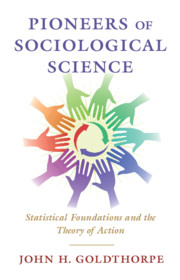Book contents
- Pioneers of Sociological Science
- Pioneers of Sociological Science
- Copyright page
- Dedication
- Contents
- Figures
- Acknowledgements
- Introduction
- 1 The Beginnings
- 2 Quetelet and His Critics
- 3 The English Statisticians
- 4 The Sample Survey Specialists
- 5 Weber and the Concept of Action
- 6 From Columbia to Chicago
- 7 From Chicago back to Columbia
- 8 Duncan and Sociology as a Population Science
- 9 The Return to the Concept of Action and Micro–Macro Relations
- 10 Conclusion
- References
- Index
9 - The Return to the Concept of Action and Micro–Macro Relations
Coleman and Boudon
Published online by Cambridge University Press: 15 February 2021
- Pioneers of Sociological Science
- Pioneers of Sociological Science
- Copyright page
- Dedication
- Contents
- Figures
- Acknowledgements
- Introduction
- 1 The Beginnings
- 2 Quetelet and His Critics
- 3 The English Statisticians
- 4 The Sample Survey Specialists
- 5 Weber and the Concept of Action
- 6 From Columbia to Chicago
- 7 From Chicago back to Columbia
- 8 Duncan and Sociology as a Population Science
- 9 The Return to the Concept of Action and Micro–Macro Relations
- 10 Conclusion
- References
- Index
Summary
By the 1960s it was becoming increasingly apparent that while major advances were being made in survey-based quantative research, and now increasingly at a macro-social level, a theoretical and explanatory deficit remained. Criticisms of ‘variable sociology’ arose on the grounds that it was not variables but the action of individuals that made things happen, and a shift in focus ‘from factors to actors’ was urged. In this development, Coleman and Boudon, both former students of Lazarsfeld, overcame their teacher’s dislike of the Weberian concept of action, and as their sociological work progressed, notably in the field of the sociology of education, action, and in particular action that could be construed as rational, became of central importance. For Coleman, a further leading concern was with the micro-macro link: i.e. withthe way in which demonstrated macro-social regularities had to be seen and explained as the outcomes, often unintended andcomplex, of individual action and interaction. Towards the end of his career, and much influenced by Chicago economics, this led him to seek – problematically -- to go beyond middle-range theory towards a general theory of social systems. Boudon also insisted on the need to show how macrosocial regularities emerged from individual action, but his interests came to focus on the development of a theory of ‘everyday’ rationality, in terms of which the individual action generating such regularities could, following Weber, be both explained and understood. In his final works he sought to show how this conception of rationality could be extended to beliefs and – more questionably – to values.
- Type
- Chapter
- Information
- Pioneers of Sociological ScienceStatistical Foundations and the Theory of Action, pp. 166 - 189Publisher: Cambridge University PressPrint publication year: 2021



